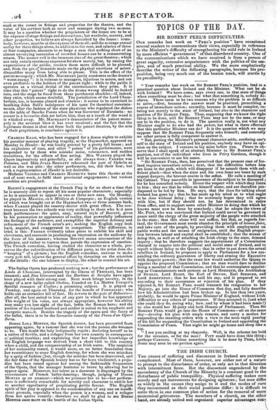TOPICS OF THE DAY.
SIR ROBERT PEEL'S DIFFICULTIES.
Oust remarks last week on " PEEL'S position " have occasioned several readers to communicate their views, especially in reference to the Minister's difficulty of strengthening his mild rule in Ireland by more efficient " government " of that disordered country. One of the communications which we have received is from a person of great sagacity, extensive acquaintance with the politics of the em- pire, and of much practical ability. We the more emphatically describe the writer of the following paragraphs, because his pro- position, being very much out of the beaten track, will startle by its peculiarity.
" Your remarks last week on Sir ROBERT PEEL'S position, lead to a practical question about Ireland and the Minister. What can he do with Ireland ? We have come, says every one, to that state of things when something must be done ; but what that something is, nobody de- clares. There seem to be two reasons why the problem is so difficult to solve,—first, because the answer must be practical, prescribing a course of immediate action ; secondly, because it must be complex, re- lating not merely to the state of Ireland, but also to the character and position of Sir ROBERT PEEL. Thus, supposing that we knew the right thing to be done, still Sir ROBERT PEEL may not be the man, or may not be in the position, to do it. The question really is, not what any Minister ought to do who had the power, but what is there effectual that this particular Minister can do? It is the question which we may suppose that Sir ROBERT PEEL frequently asks himself; and assuredly no other person is fully competent to answer it. " But, putting the Minister's personal character aside, confining one's self to the state of Ireland and his position, anybody may have an opi- nion on the subject. I venture to lay mine before you. Please to ob- serve that I shall speak of an abstract Minister in Sir ROBERT PEEL'S position, not of the individual who lives in Privy Gardens, though it will be convenient to use his name.
" Sir ROBERT PEEL, then, has perceived that the present case of Ire- land requires immediate action ; next, that the difficulties before bins are lions in the path, which will disappear if he assault them with suf- ficient pluck—that when the state and his own fame are beset by such urgent dangers, the bravest course is the safest. He calls a meeting of his Cabinet. They assemble in ignorance of the subject to be discussed ; for he has consulted nobody. Hence the respect with which they listen to him : they see that he relies ou himself alone, and are therefore pre- disposed to be led by him. He says, that the time for talking about Ireland has gone by ; that he has made up his mind as to what ought to be done without delay ; that he anxiously hopes they will agree with him, but if they should not, he has determined to retire from office, and to support some other Minister in doing that which he knows must now be done by somebody ; that he adopts the views of Mr. Parr, who was convinced that Ireland could never be governed in peace until the clergy of the great majority of the people were attached to the state ; that this alone will not suffice, but that, as regards Ire- land, the Government must needs abandon the principle of laissez faire, and take care of the people, by providing them with employment on public works and the means of emigration, until the English propor- tion between labour and capital shall be established ; that the means of doing this, as well as of attaching the Irish clergy to the state, demand inquiry ; that he therefore suggests the appointment of a Commission charged to inquire into the political and social state of Ireland, and to report without delay to the Queen ; that in order to put down the actual rebellion in Ireland, he proposes to apply to Parliament for a law sus- pending the ordinary guarantees of liberty and arming the Executive with despotic powers; that the same law would authorize the Queen to appoint the proposed Commission ; that no man would dare to decline being a member of that Commission, and that he contemplates appoint- ing as Commissioners such persons as Lord MORFETH, the Archbishop of DUBLIN, Lord ELIOT, the Earl of DEVON, Earl SPENCER, and- Lord ASHBURTON ; that he has said his say, and is prepared to act according to their acceptance or rejection of his plan. If they rejected it, Sir ROBERT PEEL would transmit his resignation to her Majesty, go into the House of Commons that day, and fully describe how his Administration had been broken up. In less than two years, probably, he would be again Prime Minister of England, without Irish difficulties or any others of importance. If they accepted it, (and what else could they do, seeing why, how, and by whom it had been made?) so also would her Majesty and both Houses of Parliament. Then Sir ROBERT PEEL would go into the House of Commons—all on the same day—develop his plan with ample reasons, and carry a motion for suspending the standing orders with a view to the most rapid passing of his bill fur suspending the Constitution in Ireland and appointing the Commission of Peace. That night be might go home and sleep like a top. " I see you smiling at my rhapsody. Well, is the scheme too bold for the occasion, or for the man ? Parr could have done this thing ; perhaps CANNING, Unless something like it be done by PEEL, Little JOHN may soon be our portion again."


























 Previous page
Previous page